THE DIALOGUE BETWEEN PUPILS AND TEACHERFeedback
Feedback bridges the gap between the results we expect the pupils to achieve and the skill and knowledge level they are currently at.
Feedback has the strongest motivational effect on a pupil if it is focused on the following:
- The quality of the pupil’s work and not how it compares to the work of others.
- Clear and detailed steps on how to improve their work.
- An outline of the progress made so far in comparison to previous assignments. Terry Crooks (2001)
Feedback can be very powerful but its effect on learning and the learning process can vary (Visible learning, Hattie).
- Prior knowledge is the prerequisite of good feedback.
- In order for feedback to be effective, trust needs to be established between the teacher and the pupil first.
- Trust needs to be integrated into very culture of the school.
- Pupils usually expect to receive feedback instantly, but a delayed feedback is much more effective.
- The feedback that pupils give to teachers is more important than the other way around.
- Grades and comments that don’t focus on what the pupils can improve on actually disturb the learning process.
- Teacher’s comments should highlight the pupils’ achievements and improvements instead of focusing only on their weaknesses.
EXAMPLESExamples of feedbacks given to pupils by teachers
Feedback should point out a pupil’s achievements not their shortcomings.
Feedback should specify how and where to improve.
Feedback should include instructions on how to improve.
EXAMPLESExamples of feedbacks given to teachers by pupils
The feedback that pupils give to the teachers is even more important than that of the teacher to the pupils. Pupils’ written and spoken feedback helps the teachers plan future activities and take the pupils prior knowledge into account.
EXAMPLESExamples of feedbacks that pupils gave each other.
We gradually encourage pupils to give quality feedback to one another. We do that by leading by example first, then talking about what constitutes quality feedback, pointing out examples of quality feedback and ineffective feedback, and finally teaching them how to write them in real life.














